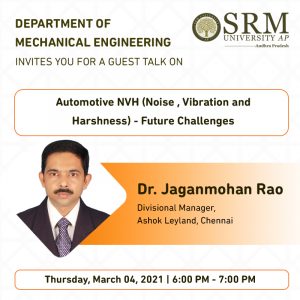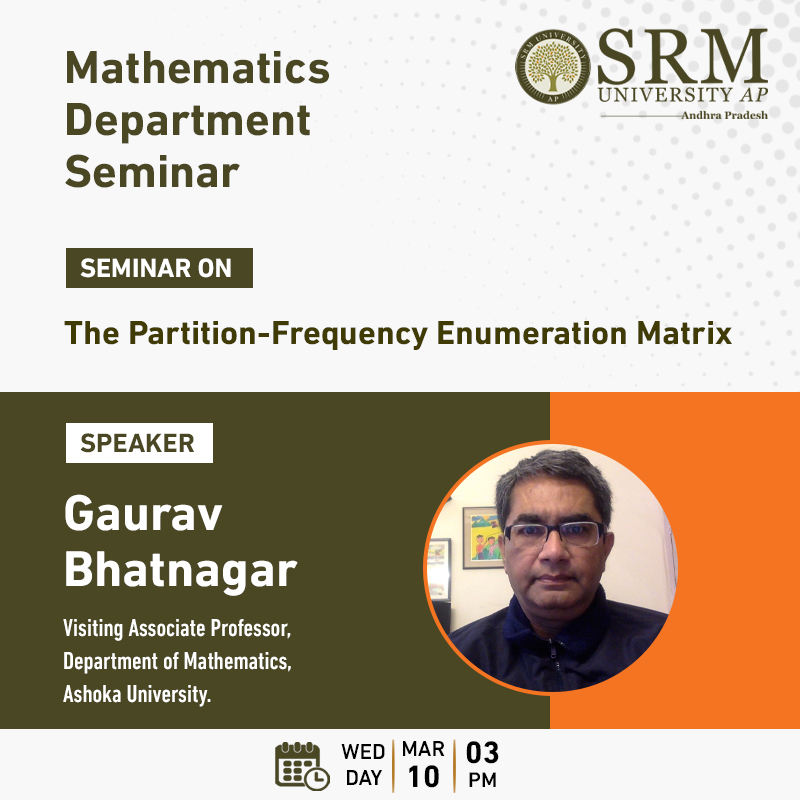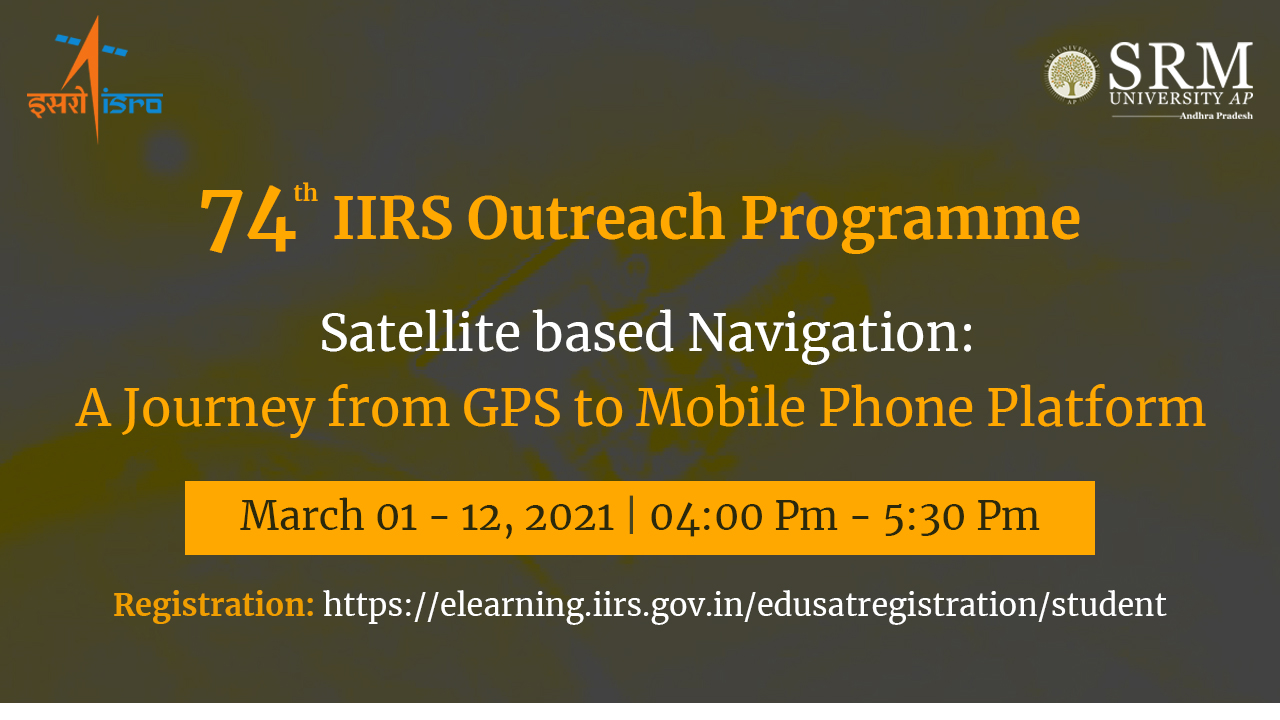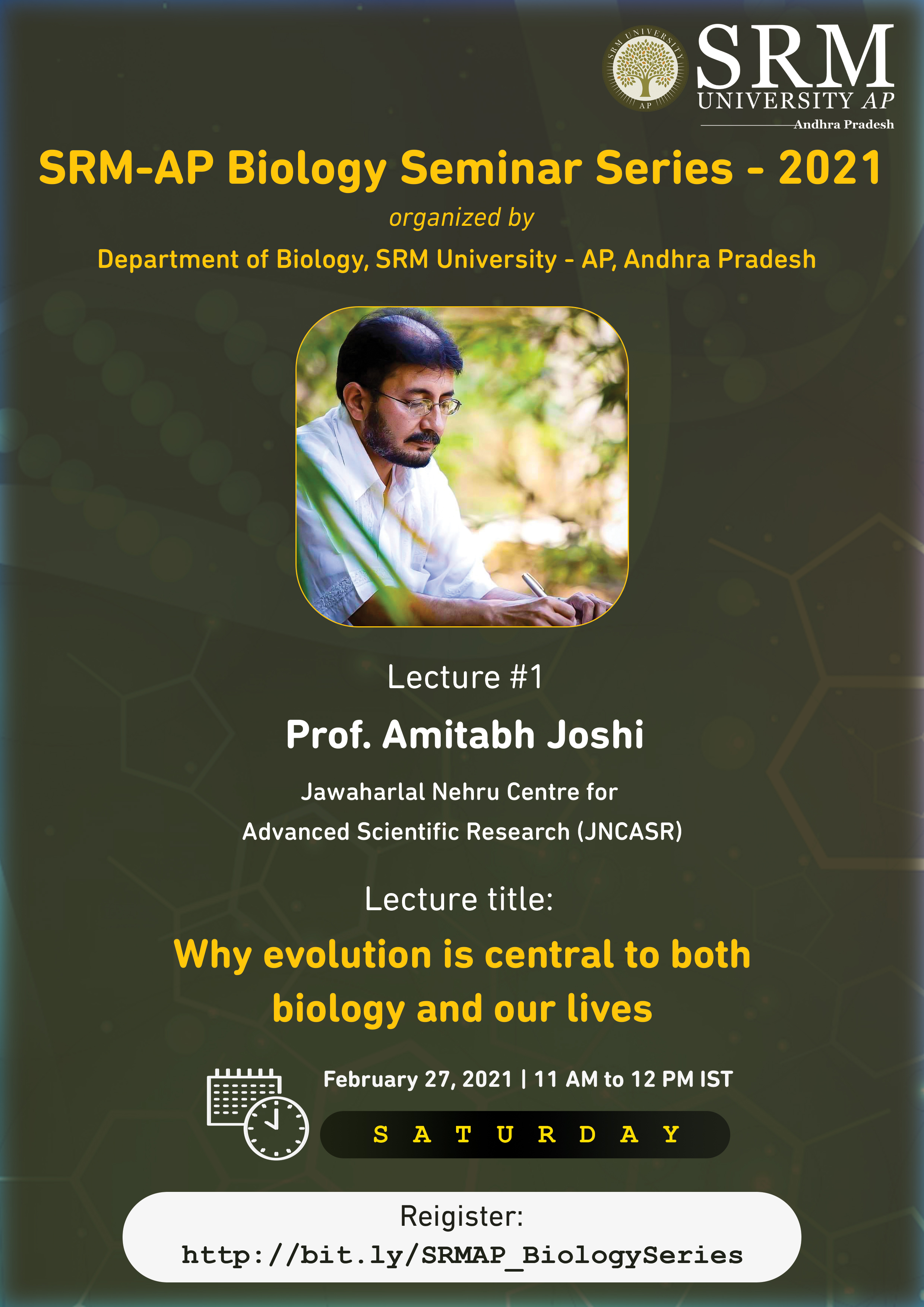SRMAP Departmental Events
- Dr Jaganmohan Rao speaks on Automotive NVH- Future Challenges March 4, 2021
 Department of Mechanical Engineering welcomes Dr Jaganmohan Rao, Divisional Manager, Ashok Leyland, Chennai, on a Webinar to enlighten the students on ” Automotive NVH (Noise, Vibration and Harshness) – Future Challenges”. The webinar is scheduled for March 04, 2021, at 6 pm. In his speech, Dr Rao will concentrate on the Basics of Automotive Noise and Vibration, NVH Development Process in Industry, NVH Tools and Techniques and Vehicle and Systems NVH.
Department of Mechanical Engineering welcomes Dr Jaganmohan Rao, Divisional Manager, Ashok Leyland, Chennai, on a Webinar to enlighten the students on ” Automotive NVH (Noise, Vibration and Harshness) – Future Challenges”. The webinar is scheduled for March 04, 2021, at 6 pm. In his speech, Dr Rao will concentrate on the Basics of Automotive Noise and Vibration, NVH Development Process in Industry, NVH Tools and Techniques and Vehicle and Systems NVH.Dr Jaganmohan Rao is an automotive professional with twenty years of vehicle development and testing experience in major automotive companies such as – Ashok Leyland, Cummins, Hero Honda and TVS motor) in India. He has been the Project Manager for many new product developments in Ashok Leyland in the NVH Domain. He further has Six Sigma Green belt and Black Belt certifications. Dr Rao was the TQBM Coordinator for Product development and a key member of Institute and Industry Relation Developments.
Dr Rao has obtained his PhD in Mechanical Engineering from the National Institutes of Technology (NIT), Trichy. He is a veteran in the field of Noise Vibration and Harshness (NVH). Prior to his doctoral studies, Dr Rao did M.S. in Applied Mechanics from the Indian Institute of Technology (IIT), Madras. His bachelor studies in Mechanical Engineering was pursued from Jawaharlal Nehru Technological University, Kakinada, Andra Pradesh. He has published 14 papers in international Journals and Conferences. He is the proud owner of 2 patents in Electric vehicle fan design. As a Research Supervisor, he has guided 10 B.Tech and 2 M.Tech Projects. Dr Rao further owns a first level TRIZ certificate from The International TRIZ Association.
Join the thought-provoking session today to groom yourself for the challenges of tomorrow.
Continue reading → - Dr Gaurav Bhatnagar to interact on “The Partition-Frequency Enumeration Matrix” March 3, 2021
 Progressing with the series of Departmental Seminars, Department of Mathematics, SRM University-AP, Andhra Pradesh invites Dr Gaurav Bhatnagar, Visiting Associate Professor, Department of Mathematics, Ashoka University to deliver a lecture titled “The Partition-Frequency Enumeration Matrix” on March 10, 2021, at 3 PM.
Progressing with the series of Departmental Seminars, Department of Mathematics, SRM University-AP, Andhra Pradesh invites Dr Gaurav Bhatnagar, Visiting Associate Professor, Department of Mathematics, Ashoka University to deliver a lecture titled “The Partition-Frequency Enumeration Matrix” on March 10, 2021, at 3 PM. The Partition-Frequency Enumeration (PFE) matrix is an infinite upper-triangular number-theoretic matrix that is used to enumerate partition-like objects as an elementary approach. This matrix unifies voluminous results connecting number-theoretic functions to partition-type functions. The calculus is extended to arbitrary generating functions and functions with Weierstrass products. As a by-product, some well-known recurrence relations for many number-theoretic functions are recovered. These include the sum of divisors function, Ramanujan’s $\tau$ function, sums of squares and triangular numbers, and $\zeta(2n)$, where $n$ is a positive integer. As an application, Ramanujan’s famous congruences $p(5n+4)\equiv 0$ (mod $5)$ and $\tau(5n+5)\equiv 0$ (mod $5)$ are embedded into an infinite family of such congruences. During the lecture, Dr Gaurav Bhatnagar will highlight two other congruence results concerning the sum of the divisor function.
Continue reading → - A prospect of exploring Satellite based Navigation in the 74th IIRS-ISRO outreach programme March 1, 2021
 SRM University-AP, Andhra Pradesh has collaborated with the Indian Institute of Remote Sensing (IIRS) -Indian Space Research Organization (ISRO)’s outreach programme, enabling the students of SRM University-AP to avail the 74th IIRS outreach programme titled “Satellite based Navigation: A Journey from GPS to Mobile Phone Platform” sponsored by the Indian Space Research Organisation, Department of Space, Government of India. This programme is scheduled for March 1-12, 2021 and will be held from 4 PM till 5.30 PM.
SRM University-AP, Andhra Pradesh has collaborated with the Indian Institute of Remote Sensing (IIRS) -Indian Space Research Organization (ISRO)’s outreach programme, enabling the students of SRM University-AP to avail the 74th IIRS outreach programme titled “Satellite based Navigation: A Journey from GPS to Mobile Phone Platform” sponsored by the Indian Space Research Organisation, Department of Space, Government of India. This programme is scheduled for March 1-12, 2021 and will be held from 4 PM till 5.30 PM. In the modern era, an enormous volume of geo-spatial data is acquired from various sources, which is further processed for various studies on earth’s resources. These geospatial datasets require secondary data in the form of geo-tagged samples, Ground Control Points (GCPs), and ground-based large scale maps, which can be acquired using Global Navigation Satellite System (GNSS) technology. Apart from its applications in precise positioning, GNSS has applications in various areas such as Total Electron Content (TEC) estimation, earthquake studies, atmospheric studies, and mobile Geographic Information System (GIS).
The 74th outreach programme is committed to impart the basic information about the GNSS, followed by the studies carried out in different related areas. At the end of this course, participants will be able to comprehend the use of GNSS receivers with different measurement and positioning techniques as per the application requirement.
Programme Details: Please Click Here
Programme Schedule: Please Click Here
Registration Link: Please Click Here
For further details, Visit Here
Continue reading → - Prof Amitabh Joshi to initiate the SRM-AP Biology Seminar Series – 2021 February 20, 2021
 The Department of Biological Sciences, SRM University-AP, Andhra Pradesh has taken an initiative to organize the SRM-AP Biology Seminar Series – 2021. During the series, prominent scientists in the field of Biology from India and abroad will deliver a lecture every month through the virtual platform. The lectures are designed to encompass various topics on modern Biology to inspire scientists, undergraduate and postgraduate students, PhD scholars, and faculty members.
The Department of Biological Sciences, SRM University-AP, Andhra Pradesh has taken an initiative to organize the SRM-AP Biology Seminar Series – 2021. During the series, prominent scientists in the field of Biology from India and abroad will deliver a lecture every month through the virtual platform. The lectures are designed to encompass various topics on modern Biology to inspire scientists, undergraduate and postgraduate students, PhD scholars, and faculty members.Prof Amitabh Joshi, Professor and Chairman, Evolutionary and Organismal Biology Unit, Jawaharlal Nehru Centre for Advanced Scientific Research in Bangalore, India, will be delivering the opening lecture of the series on February 27, 2021, at 11 AM. The erudite professor will be illuminating the audience on “Why evolution is central to both biology and our lives”. In this talk, Prof Joshi will address some of the misconceptions pertaining to evolution, and illustrate that evolutionary Biology is a very well-established and verified body of scientific knowledge. He will also demonstrate that an evolutionary perspective is not just central to Biology as a discipline, but also capable of addressing several unrelenting societal problems. Further, Prof Joshi will mention some of the significant Indian contributions to the development of evolutionary thinking over the past three to four decades.
Prof Joshi attained PhD in Genetics (1993) from Washington State University, Pullman. He then worked as a postdoctoral fellow with Laurence D Mueller at the University of California, Irvine (1994-96). He has been a Fellow at the Institute of Advanced Studies, Berlin, in 2001. Prof Joshi’s current research interests are in life-history evolution population dynamics, and he uses a combination of experimental approaches and theoretical work using computer simulations to carry out evolution studies of fruit flies. Also, he has worked on the evolution of extreme ecological specialization, and the evolutionary maintenance of sexual reproduction.
Prof Joshi has also served the editorial boards of Resonance, Journal of Genetics, Journal of Biosciences, International Journal of Evolutionary Biology, and Journal of Theoretical Biology. He is presently the Editor-in-Chief of the Journal of Genetics. In addition, Prof Joshi is a Fellow of all the three national science academies of India. He has been awarded the Shanti Swaroop Bhatnagar Award (Biological Sciences) in 2009, and the Lakshmipat Singhania-IIM Lucknow Young Leader in Science and Technology (National Leadership Awards) in 2010. He is also a J C Bose National Fellow. Recently, a new ant species discovered from Kerala has been named after Prof Amitabh Joshi.
Registration Link: Registration Link
Continue reading → - Dr Ravi Prakash to illustrate Homogenization Problem and Tartar’s Method February 17, 2021
 Department of Mathematics, SRM University-AP, Andhra Pradesh presents departmental seminar on “Introduction to Homogenization Problem and Tartar’s Method”. During the session on February 17, 2021, at 5.30 PM, Dr Ravi Prakash, Assistant Professor, Departamento de Matem ́atica, Universidad de Concepci ́on, Concepci ́on, Chile, will describe this mathematical theory that has been introduced to explicate the behaviour of composite materials used by the material scientists. He will illustrate this model by drawing example of a homogenized material.
Department of Mathematics, SRM University-AP, Andhra Pradesh presents departmental seminar on “Introduction to Homogenization Problem and Tartar’s Method”. During the session on February 17, 2021, at 5.30 PM, Dr Ravi Prakash, Assistant Professor, Departamento de Matem ́atica, Universidad de Concepci ́on, Concepci ́on, Chile, will describe this mathematical theory that has been introduced to explicate the behaviour of composite materials used by the material scientists. He will illustrate this model by drawing example of a homogenized material. The aim of ’Homogenization’ is precisely to give the macroscopic properties of the composite by taking into account the properties of its structure. For a good understanding of this area, one must have a definite knowledge of Distribution Theory, Functional Analysis, Measure Theory, and Differential Equations.
The theory of Homogenization has reaching applications in several areas (including composite materials) such as porous media, analysis of their structures, etc. During the session, the esteemed guest lecturer will enable the audience to comprehend how Tartar’s Method uses two scales for the characterization of the material – the microscopic one, describing the heterogeneities, and the macroscopic one, describing the global behavior of the composite.
Continue reading →

